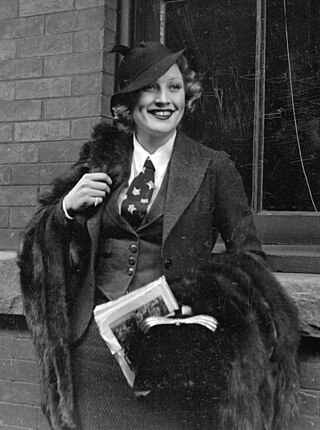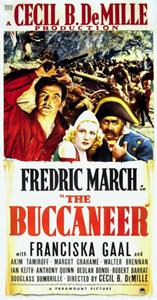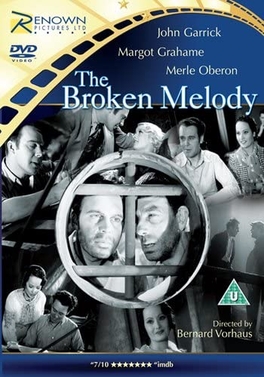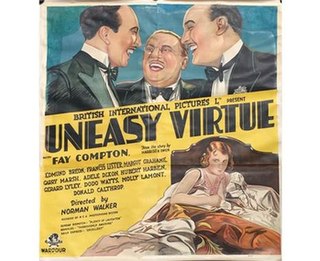Related Research Articles

Timbuktu is a city in Mali, situated 20 kilometres north of the Niger River. The town is the capital of the Tombouctou Region, one of the eight administrative regions of Mali, having a population of 54,453 in the 2009 census.

Margot Grahame was an English actress most noted for starring in The Informer (1935) and The Three Musketeers (1935). She started acting in 1930 and made her last screen appearance in 1958.

The Buccaneer is a 1938 American adventure film made by Paramount Pictures starring Fredric March and based on Jean Lafitte and the Battle of New Orleans during the War of 1812. The picture was produced and directed by Cecil B. DeMille from a screenplay by Harold Lamb, Edwin Justus Mayer and C. Gardner Sullivan adapted by Jeanie MacPherson from the 1930 novel Lafitte the Pirate by Lyle Saxon. The music score was by George Antheil and the cinematography by Victor Milner.
The Rosary is a 1931 British drama film directed by Guy Newall and starring Margot Grahame, Elizabeth Allan and Leslie Perrins. It was shot at Twickenham Studios in London. The film's sets were designed by the art director James A. Carter. It was released as an independent first feature, despite being produced by a company that generally concentrated on quota quickies.

The Broken Melody is a 1934 British musical drama film directed by Bernard Vorhaus and starring John Garrick, Margot Grahame, Merle Oberon and Austin Trevor.

An Alligator Named Daisy is a 1955 British comedy film directed by J. Lee Thompson and starring Donald Sinden, Jeannie Carson, James Robertson Justice, Diana Dors, Roland Culver and Stanley Holloway. It was based on the 1954 novel of the same name by Charles Terrot.

Uneasy Virtue is a 1931 British comedy film directed by Norman Walker and starring Fay Compton, Edmund Breon, Francis Lister, Donald Calthrop, and Garry Marsh. It was produced by British International Pictures and shot at the company's Elstree Studios. The film was based on the 1927 West End play The Happy Husband by Harrison Owen.

Yes, Mr Brown is a 1933 British musical comedy film directed by Herbert Wilcox and starring Jack Buchanan, Hartley Power, Elsie Randolph and Margot Grahame. According to the Idaho Falls Post Register, the film was "gay catchy...entertainment with plenty of light comedy", in which "the manager of the Viennese branch of a large American toy firm [played by Buchanan] sets out to entertain his visiting boss [played by Power] in an effort to win a partnership." Yes, Mr. Brown is currently missing from the BFI National Archive, and is listed as one of the British Film Institute's "75 Most Wanted" lost films.

Dr. O'Dowd is a 1940 British drama film directed by Herbert Mason, produced by Sam Sax for Warner Bros and starring Shaun Glenville, Peggy Cummins, Felix Aylmer and Irene Handl. Set in Ireland, it focuses on Marius O'Dowd, an Irish doctor, who works to restore his relationship with his son after his daughter-in-law dies under O'Dowd's care. The film was the onscreen debut for Peggy Cummins, who was only thirteen at the time. It was well received by critics, and Cummins' role was the subject of particular praise. The film is currently missing from the BFI National Archive, and is listed as one of the British Film Institute's "75 Most Wanted" lost films.
The Man I Want is a 1934 British comedy film directed by Leslie S. Hiscott and starring Henry Kendall, Wendy Barrie and Betty Astell. The screenplay concerns a man who accidentally comes across some stolen jewels. The film was made at Beaconsfield Studios.
Men of Steel is a 1932 British drama film directed by George King and starring John Stuart, Benita Hume and Heather Angel. The screenplay was adapted by Edward Knoblock and Billie Bristow from a novel by Douglas Newton. It was shot at Walton Studios as a quota quickie for distribution by United Artists.
Glamour is a 1931 British drama film directed by Seymour Hicks and Harry Hughes and starring Hicks, Ellaline Terriss and Margot Grahame. A young, ruthless woman falls in love with a rising actor. It was loosely remade for the 1934 American film Glamour. There are currently no known surviving copies of the original film.
Falling in Love is a 1935 British comedy film directed by Monty Banks and starring Charles Farrell, Mary Lawson, Diana Napier and Gregory Ratoff. The film was shot at Walton Studios. It was released in the United States the following year under the alternative title Trouble Ahead.

The Flying Fool is a 1931 British comedy thriller film directed by Walter Summers and starring Henry Kendall, Benita Hume and Wallace Geoffrey. It was based on a 1929 play of the same name.
The House Opposite is a 1931 British crime film directed by Walter Summers and starring Henry Kendall, Frank Stanmore and Arthur Macrae. It was shot at Elstree Studios outside London. It was based on the 1931 novel The House Opposite by Joseph Jefferson Farjeon. It follows a police officer who pursues a gang of blackmailers.
Sir or Madam is a 1928 British-German silent comedy film directed by Carl Boese and starring Margot Armand, Percy Marmont and Ossi Oswalda. It was based on the 1923 novel Sir or Madame by Berta Ruck and shot at Elstree Studios near London. The film was a co-production between Germany and Britain, with separate versions released in the countries. In Britain it was not released until February 1930.
The Innocents of Chicago is a 1932 British comedy film directed by Lupino Lane and starring Henry Kendall, Binnie Barnes and Margot Grahame.

The Love Habit is a 1931 British comedy film directed by Harry Lachman and starring Seymour Hicks, Margot Grahame and Edmund Breon. It was made at Elstree Studios with production beginning in August 1930. Produced by British International Pictures, the largest British film company of the time, it was released in January the following year. It was based on a French play Pour avoir Adrienne by Louis Verneuil.
Crazy People is a 1934 British comedy film directed by Leslie S. Hiscott and starring Henry Kendall, Nancy O'Neil and Kenneth Kove. It was made at Beaconsfield Studios as a quota quickie. It was based on the novel Safety First by Margot Neville.
Without You is a 1934 British comedy film directed by John Daumery and starring Henry Kendall, Wendy Barrie and Margot Grahame. It was made at Beaconsfield Studios as a quota quickie.
References
- ↑ Walter Summers Wood, Linda. BFI Screen Online. Retrieved 19-10-2010
- ↑ Mediatheque films Archived 29 June 2011 at the Wayback Machine British Film Institute. Retrieved 19-10-2010